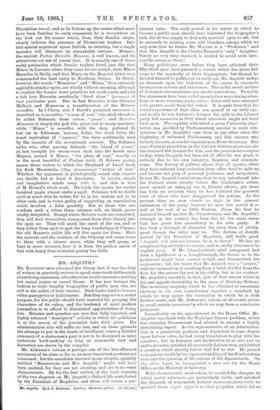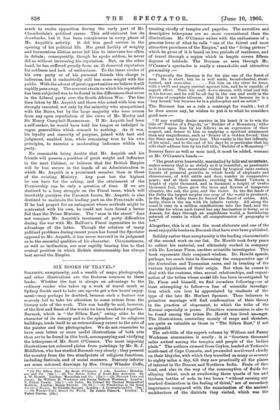MR. ASQUITH.*
BAGEHOT once advanced the theory that it was the duty of writers in quarterly reviews to speak some truth deliberately about living statesmen, who otherwise would encounter nothing but casual praise or casual blame. It has now become the fashion to write lengthy biographies of public men who are still in the midst of their careers. Such books tend to become either panegyrics or indictments. But they may serve a useful purpose, for the public should have material for gauging the characters of its rulers, and the, tendency of most modern journalism is to afford it diminished opportunities of doing this. Debates and speeches are now less fully reported, and highly coloured " descriptive " articles in which the politician is at the mercy of the journalist take their, place. His administrative acts will suffer no less, and on these grounds the attempt to put in the hands of intelligent voters a faithful summary of a statesman's past is not to be dismissed as mere audacious book-making so long as reasonable tact and discretion are shown by the compiler.
Mr. Alderson's volume is perhaps one of the less offensive specimens of its class so far as its more important portions are concerned; but the anecdotes inserted in one chapter, quaintly entitled "Recreations and Mrs. Asquith," might well have been omitted, for they are not amusing, and are in no sense characteristic. By far the best section of the book consists of the two chapters on Mr. Asquith's Oxford life contributed by the President of Magdalen, and these will retain a per- manent value. The early period in his career at which be became a public man should have lightened the biographer's task, for he has simply to deal with material open to all ; but he succeeds in making some odd blunders, among which we may note that he thinks Mr. Warren is a "Professor," and that Mrs. Asquith is Sir Charles Tennant's " only " daughter. Surely no very deep research is needed to avoid such inex- cusable errors as these !
Many politicians, even before they have attained their fifty-third year, have pursued a course which has given full scope to the ingenuity of their biographers; but though he devoted himself to politics at an early age, Mr. Asquith makes no demands upon the historian of his career to reconcile incongruous actions and utterances. This is the result neither of fortunate circumstances nor elastic convictions. Probably few statesmen have been called upon to face more trying situa- tions or more exacting party crises ; fewer still have emerged with greater credit from the ordeal'. It is quite true that his actual experience of high office was gained at an early age, and in this he was fortunate, because the split in the Liberal party left vacancies in 1892 which otherwise might not have been open. The rapidity with which a great University repu- tation was justified by Parliamentary success is more con- spicuous in Mr. Asquith's case than in any other since the beginning of reformed Parliaments, and this success was entirely his own, as was his reputation as Home Secretary. But since Fortune placed him in the Cabinet thirteen years ago she has reserved few favours for him, and the position he occupies to-day, when his party has been out of office for ten years, is entirely due to his own integrity, firmness, and common- sense. The history of politics shows that all parties, when they have endured long exclusion from office, tend to split up and become the prey of personal jealousies and antipathies. It was Mr. Asquith's misfortune that he was introduced into the Cabinet circle shortly before Mr. Gladstone's retire- ment opened an unhappy era in Liberal affairs ; yet there has been no occasion when he has forfeited the goodwill even of those who have disapproved his actions. At the present time no man stands so high in the general estimation of the party, because no man has served it so well at the cost of so little friction. From the first he matched himself against Mr. Chamberlain, and Mr. Asquith's triumph in the country has been due to the same cause that has given him ascendency in his own party. It has been a triumph of character far more than of ability, great though the latter may be. The dictum of Jowett, quoted by the President of Magdalen, still holds good. "Asquith will succeed because he is so direct." He has no compromising attitudes to excuse, and no shifty utterances to explain away. If Mr. Chamberlain's chief antagonist had been a Lyndhurst or a Loughborough, the thrust as to his profession might have carried weight and disconcerted his arguments ; but the taunt that Mr. Asquith was a "lawyer," with the insinuation of speaking from a brief, fell flat from the first, for the answer lay not in his ability, but in his conduct. Mr. Asquith's record is, in fact, just of that nature which in the end appeals irresistibly to the mass of thinking Britons. The increasing majority which he has obtained in successive elections in his own constituency supplies a standard by which we may gauge the estimation in which he is held further south, and Mr. Alderson's volume at all events serves to recall certain occasions by which we may form a conclusive judgment.
Immediately on his appointment to the Home Office Mr. Asquith was faced with the Trafalgar Square problem, whith the outgoing Government had allowed to assume a highly threatening aspect. As the representative of an Administra- tion in a precarious position, and dependent in some degree upon Labour votes, he had every temptation to play with the question ; but by firmness and moderation he at once put an end to disorder, satisfied all reasonable Labour men, and settled a question which shortly before -bad led to riot. He gained even greater credit by his vigorous handling of the Featherstone riots and the question of the release of the dynamitards. On the other band, he inaugurated a new era for the Home Office as the Ministry of Industry.
With characteristic moderation, lie avoided the dangers to which social reformers are particularly liable, and satisfied the demands of responsible Labour representatives while he avoided those vague appeals to class prejudice which did so much to excite opposition during the early part of Mr. Chamberlain's political career. This self-restraint has its drawbacks, but it has been conspicuous in every phase of Mr. Asquith's activity. It did him good service in the opening of his political life. His great facility of weighty and harmonious diction never led him to intervene too often in debate; consequently, though he spoke seldom, he never did so without increasing his reputation. But, on the other hand, he has suffered greatly from an ill-deserved reputation for coldness and lack of enthusiasm. To the inner circles of his own party or of his personal friends this charge is ludicrous, but it undoubtedly still has some weight with the public. With the advent of great opportunities we believe it will rapidly pass away. The severest strain to which his reputation has been subjected was to be found in the differences that arose in the Liberal party over the South African War. The line then taken by Mr. Asquith and those who acted with him was strongly resented, not only by the minority who sympathised with the Boers, but by the large majority who were averse from any open repudiation of the views of Mr. Morley and Sir Henry Campbell-Bannerman. If Mr. Asquith had been a self-seeker, he would have held his tongue or indulged in vague generalities which commit to nothing. As it was, his loyalty and sincerity of purpose, joined with tact and judgment, enabled him, while remaining true to his own principles, to exercise a moderating influence within his party.
No reasonable being doubts that Mr. Asquith and his friends will possess a position of great weight and influence in the next Cabinet, or believes that the British Empire will be less secure in the hands of an Administration in which Mr. Asquith is a prominent member than in those of the existing Ministry. Any post but the highest he can have for the asking, and the attainment of the Premiership can be only a question of time. If we are destined to a long struggle on the Fiscal issue, which will inevitably paralyse the Unionist forces, Mr. Asquith is also destined to maintain the leading part on the Free-trade side. If he had prayed for an antagonist whose methods might be contrasted with his own, he could not have found a better foil than the Prime Minister. The "man in the street" does not compare Mr. Asquith's treatment of party difficulties during the war with Mr. Balfour's Fiscal ingenuities to the advantage of the latter. Though the solution of many political problems during recent years has found the Spectator opposed to Mr. Asquith, it has never wavered in its judgment as to the essential qualities of his character. Circumstances, as well as inclination, are now rapidly bearing him to that central position in which British statesmanship has always best served the Empire.







































 Previous page
Previous page